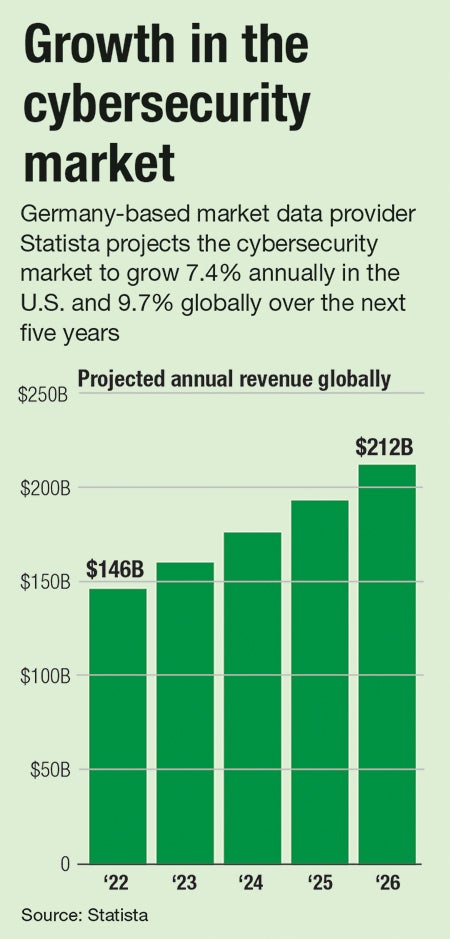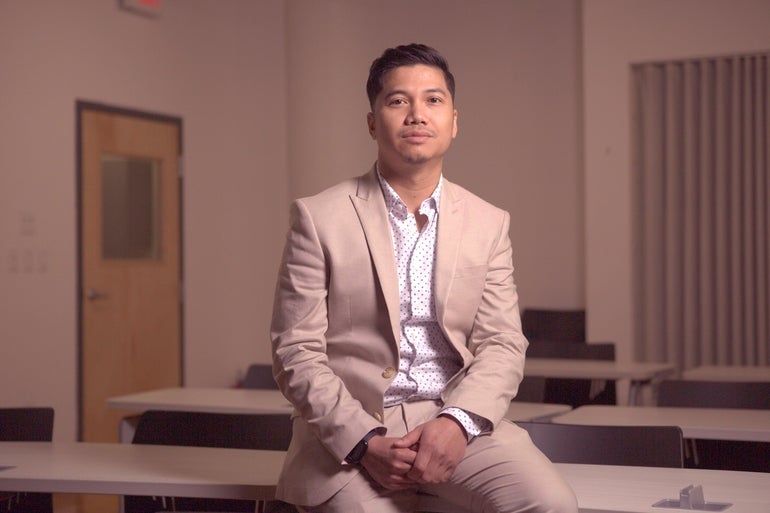The two businesses Sonny Phengsomphone has started in Central Massachusetts are just part of his immigrant journey.
Get Instant Access to This Article
Subscribe to Worcester Business Journal and get immediate access to all of our subscriber-only content and much more.
- Critical Central Massachusetts business news updated daily.
- Immediate access to all subscriber-only content on our website.
- Bi-weekly print or digital editions of our award-winning publication.
- Special bonus issues like the WBJ Book of Lists.
- Exclusive ticket prize draws for our in-person events.
Click here to purchase a paywall bypass link for this article.
Sonny Phengsomphone stood in the woods of Laos, near the banks of the Mekong River. Alongside his mother and sister, he peered through the darkness that befell the Mekong. His father, having told the family to stay put, had set out alone in search of a boat to bear them across the water. They waited.
Just across the river situated salvation: a Thai refugee camp. Hundreds of thousands of people had crossed the same water body for that same reason, and it was no easy feat. Those who embarked on the swim potentially faced death: drowning, or catching bullets from Laotian soldiers.
After trudging through the murky river, Phengsomphone’s father eventually landed upon a bordering residence, which crucially contained a docked boat. Assisting refugees was illegal, and expecting opposition, he brought an important commodity: gold.
Tempting the homeowner with the valuables, he secured the raft, on one condition: do what you have to do, but bring it back immediately.
“Maybe that [trade] is kinda how I got my business savviness [from my dad],” laughs Sonny Phengsomphone.
As owner and founder of Worcester cybersecurity company BitSpartan and co-owner of Northborough nail salon Lush Nail Lounge, Phengsomphone’s tale of immigration illuminates a key trait necessary to entrepreneurs: perseverance.
The Phengsomphones fled their home country in 1985. Laos, which had ended its 16-and-a-half year civil war only a decade before, was essentially a totalitarian state. The new government imposed several restrictions on civil liberties, including threats of physical violence against political dissidents.
Both tourism and emigration were effectively banned, so there was only one way to leave the country: escape.
“There were a lot of human rights violations,” said Phengsomphone. “People were scared of the government … We were fleeing Laos, and I say flee because there weren't any humanitarian [organizations] to help us get to another country.”
As the family waiting on the banks of the Mekong, Phengsomphone’s father eventually returned, and off the four went. After trekking through the Thai wilderness, and narrowly avoiding brushes with immigration officials, they landed at the refugee camp.
Thus spearheaded the start of a new life.
A refugee turned IT professional
The family stayed in the refugee camp for about three years, during which time Phengsomphone’s sister passed away. Ultimately, they received sponsorship from a person in the United States, which required them to move to a U.S. immigration facility in the Philippines. They stayed there for about a year, during which time Phengsomphone’s younger brother was born.
Finally, in 1988, the family reached the U.S. Phengsomphone first arrived in Rockford, Ill., close to his sponsor, before eventually moving to New England. Phengsomphone’s family first landed in Hartford before settling in Woonsocket, R.I.
In Hartford, Phengsomphone figured out the course for his life.
“I was in seventh grade when my teacher said, ‘Hey, this is what you can do,’” Phengsomphone said. “And she gave me a list of all the fields that I could get into.”
Combing through that list, two fields piqued his interest: engineering and computing. This was due, in part, to its starting pay being significantly higher than what his parents made.
“I can make, you know, three-to-four times the amount of money my parents made [as an engineer]. My dad, who woke up at five in the morning, and came home with oil and grease stuck in his skin and eyes … while [in IT] I can use my brain, wear a suit and tie, be clean, and also make much more money,“ Phengsomphone said. “From then on, I’ve always had that in my head.”
Carrying this mindset throughout high school, it eventually helped Phengsomphone secure an internship at Amica Insurance in Lincoln, R.I. There, he met an adjunct professor from Johnson & Wales University in Rhode Island, who invited him to the university’s then-new IT degree program. Knowing college was necessary to live the life he aspired to, he pounced on the opportunity.
Due to the family’s low income, he feared he would start from a disadvantaged position to pay for college. However, through scholarships and federal grants, he secured an education at Johnson & Wales. He graduated with a bachelor’s degree in information technology in 2005, then immediately started work as a technical project manager with Connecticut consulting company Pitney Bowes.
Later, he worked four years as a systems administrator with Millbury material solutions company Barrday. Traveling daily to there from Woonsocket, he had his first exposure to his future home: Worcester.
His first taste of entrepreneurship
Phengsomphone continued to work at several IT companies for over a decade in various positions, including senior positions as a systems administrator, mainly specializing in infrastructure technology. Eventually, he made the move to Central Massachusetts, arriving in Northborough to be closer to his job at tech consultant NFP Health in Braintree.
While living in Northborough, and with the influence of his girlfriend, a cosmetologist, he had his first taste of business ownership. Despite him having no entrepreneurial experience, in 2017 the two and another family member founded the Lush Nail Lounge, off Route 20 in Northborough.
“I knew nothing about opening my own business. I knew nothing about the beauty industry … but I made sure to give it my all to see the successful outcome of it. Some of the things in my life have yielded great results because of this belief [of giving my all],” Phengsomphone said.
While remaining co-owner of the lounge, he continued to work at NFP Health until late 2020. During this time he moved to Worcester with his girlfriend, partially to save money, but also because he had his eyes on something new: his own cybersecurity company.
Creating his own success

Working under other people for nearly 20 years eventually made Phengsomphone disillusioned.
“I came to a point in my career where I wasn’t happy where I was,” Phengsomphone said. “I just [didn’t] want to work for anyone else anymore.
"I have always put 100% into my work [under others], but never received a great outcome from it," he said, referring to his desire to reach his full potential as a professional and a business owner.
With that as a motivator, Phengsomphone secured capital and founded BitSpartan Security, in December of 2020. Seeing all the new developments in Worcester since his time at Barrday in 2008, he was inspired, and so he founded BitSpartan right in the heart of downtown at the WorcLab incubator in the Printers Building.
The business offers cybersecurity services to businesses throughout the commonwealth. Phengsomphone said he chose cybersecurity as it was more fulfilling than working on computer infrastructure systems, because cybersecurity specifically deals with the protection of individual people.
“I realized maybe five or six years ago that [cybersecurity] was my passion,” Phengsomphone said. “When I started looking at [cybersecurity], I realized that it was a much larger issue than just business alone … I’m not just helping organizations, but individual people. And if that information isn’t protected, we have the issues that we see today.”
The cybersecurity market is expected to grow 7% annually in the U.S. over the next five years and become a $212-billion market globally by 2026, according to Germany-based market intelligence provider Statista.
Cybersecurity is an ever-growing, big business, and it's even bigger for the criminals, said Michelle Drolet, CEO and founder of Framingham cybersecurity company Towerwall.
“It’s a trillion-dollar industry [for the criminals],” Drolet said. “It’s never ending. [Attacks] will always be present. I predict by 2025, there’s going to be over two million jobs in the cybersecurity space.”
Following some snags and logistical issues, Phengsomphone opened BitSpartan's doors to the public in spring of this year. At this stage, the company is working to secure contracts with state and federal agencies, as well as working on gaining contractors and freelancers.
While the future of the business’s prosperity is unknown, Phengsomphone remains confident in any outcome.
“At my [past] job, I’ve made sure [other businesses] are successful,” Phengsomphone said. “Why can’t I do that for myself? Why can’t I do that for my family? Bottom line, there’s no one telling you that you can’t do something. You can show your own success. I feel at this stage in my life … that if I pursue something, and even if it ends in failure, I would be fine with that. Because I actually tried doing it.”

